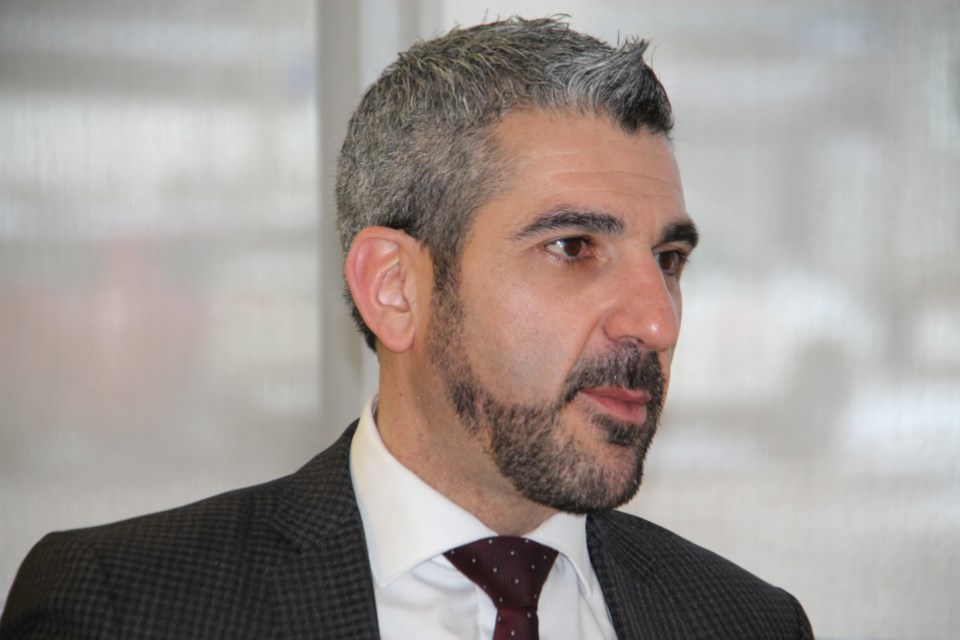Approximately 2,500 trial participants will take part in Toronto-based Myant Inc.’s project involving ‘connected wearables’ designed to sense, monitor and help detect symptoms that may signal the onset of diseases, including COVID-19.
The Ontario government is putting over $1.5 million into the project to assist Myant, it was announced by Minister of Economic Development, Job Creation and Trade Vic Fedeli, accompanied by Sault MPP and Minister of Colleges and Universities Ross Romano in a virtual announcement Wednesday.
The insertion of biometric sensors into fabric and creating textile-based medical devices and connected wearables is known under the brand name Skiin.
Myant will produce Skiin kits to be distributed to the 2,500 trial participants.
Trial participants will wear undergarments, such as underwear, undershirts and bras embedded with Myant technology that connects to and transmits continuous health data through a smartphone, laptop or PC to a health provider and family members caring for elderly or isolated, physically ill individuals.
That live data includes an individual’s blood pressure, heart function and body temperature.
“When you’re being monitored, every time you’re wearing this clothing it’s automatically feeding this information to your cell phone and your loved ones,” Romano said.
Algoma University computer science students and Sault Area Hospital (SAH) will have access to the data during the trial.
“So if you have a parent who is living alone or living remotely somewhere and doesn’t have access to continuous care, you could have continuous 365 days a year, 24 hours a day (monitoring capability), at every moment you’re connected to your loved one and you know if they’re okay, what their blood pressure is, what their temperature is, whether they’ve been sitting, standing for extended periods of time,” Romano said.
“This is so critical in the development of our localized health care needs. We have said, as northerners especially, one of the number one challenges is we can’t have a one size fits all approach, especially when we talk about health care in Northern Ontario with these vast distances that separate us. There are challenges with (access to) specialists, challenges with access to the top notch quality care out there, but imagine a situation where your doctor or specialist may be in another jurisdiction somewhere but has live, accurate data.”
“If you’re saying ’I’ve been lying down for an hour,’ your doctor will know whether that’s true or false because they’re going to have that data,” Romano said, adding the technology will be valuable in caring for patients with dementia, for example.
“Sault Ste. Marie is going to be the first to get to have access to this,” the MPP said.
“You just put it on and your body temperature, your ECG, your location, your data is continuously going to be beaming not only to yourself so you can be aware but also to your family, to your doctors, to your nurse, to your caregiver, so you can stay informed and stay safe,” said Tony Chahine, Myant CEO, addressing Wednesday’s virtual audience.
“This is significant technology that we have made right here in Ontario and we’re so proud to bring it to Sault Ste. Marie first.”
“A lot of us are living alone and scared (especially during the COVID-19 pandemic)...I sincerely believe together we can strengthen the fabric of society for Sault Ste. Marie,” Chahine said.
“Right now this is a trial with 2,500 people, volunteers. This isn’t a mandatory product. It’s a commercial product, an innovative, made in Ontario product...it will be deployed as a remote patient monitoring system for those who want it,” Minister Fedeli said, speaking to SooToday in regard to some who may have privacy concerns, or concerns about potential future compulsory implementation of such technology, embedded in undergarments, for the general population.
“It’s definitely not mandatory. Obviously voluntary...this is to get the product out and we’re the first to be able to utilize this technology,” Romano said.
“Any research that Algoma University participates in...will go through our research ethics boards and all those questions will be considered very carefully,” said Donna Rogers, Algoma University vice-president academic and research.
Both Rogers, on behalf of Algoma University, and Dr. James Chan, SAH innovation director, expressed their appreciation for being involved in the Skiin trial program.
“We have experience at the hospital in implementing new technologies like this and we really look forward to the opportunity to trial this technology and all of its facets with an array of people we serve here in a rural, remote context,” Chan said.
Trial participants will wear Skiin garments for three to four months.
Myant hopes to fully launch Skiin in the market by the summer of 2021. Once commercialized, Skiin will be manufactured at the company's facility in Toronto.
The funding announced Wednesday for Myant is anticipated to create up to 80 new jobs and retain 100 others for Ontarians, Fedeli said.
